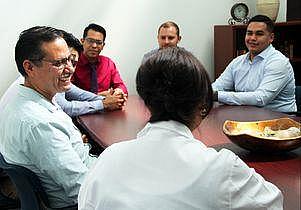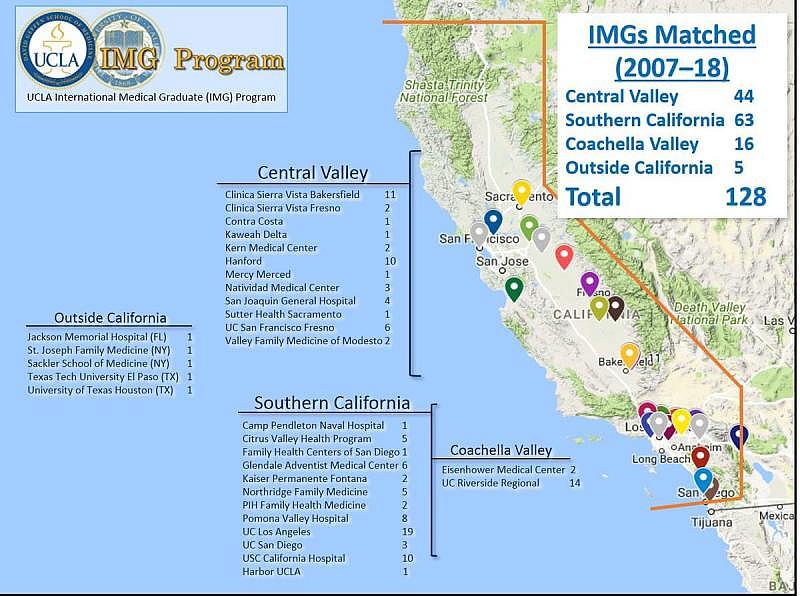Doctor Shortage: UCLA Program Trains Immigrant Physicians To Serve In The I.E.
This story was produced for the USC Center for Health Journalism’s California Fellowship.
Other stories in this series include:
Doctor Shortage: How the Inland Empire Came To Have So Few Physicians
Doctor Shortage: Lack of Behavioral Health Professionals Takes Toll On I.E. Residents' Mental Health
Doctor Shortage: UCR Programs Aim To Keep Aspiring Doctors In The Inland Empire
Doctor Shortage: Two New I.E. Healthcare Schools Work To Address Primary Care Shortage

Dr. Michelle Bholat talks with students in the UCLA International Medical Graduate Program. Credit UCLA Health
As part of KVCR’s series on the Inland Empire’s doctor shortage, we explore a UCLA program that trains immigrant doctors to serve in medically under-represented areas of California. KVCR’s Benjamin Purper has the story.
You’ve probably heard the term “brain drain” - but what about “brain waste?” That’s when highly educated immigrants end up working far below their education level. Maybe it’s an engineer working in fast food, or a surgeon cleaning houses.
But California, which is facing a statewide physician shortage, can’t afford not to take advantage of the talent we have here. At least, that’s the reasoning behind UCLA’s International Medical Graduate program.
“The IMG program started as a result of a need and that need being a tremendous lack of primary care physicians in areas that are under resourced,” says Dr. Michelle Bholat, Executive Director of the program.
She explains that the IMG program helps immigrant doctors pass their U.S. licensing exams and obtain U.S. residencies.
It also requires them to practice in under-resourced areas for two to three years after their residency. And since the IMG’s are recruited from Latin America, the hope is that they’re better equipped to care for Southern California’s Latino immigrant population.
“It was obvious that to have culturally and linguistically concordant individuals for a population that to address the chronic care issues in communities and to address health in a way that hadn't been addressed because there were no doctors, that this program, if we could launch, it could make a significant impact,” Bholat says.
Out of the 128 IMG’s that have gone through UCLA’s program, 24 have ended up in the Inland Empire.
(Credit: UCLA Health)
Dr. Iliana Aguila is one of them. Aguila was born in El Salvador, where she was raised by a single mother.
“She was always there for us, she worked really hard for me to get education,” Aguila says. “I'm the first one to ever go to med school, even to university. So I'm very very proud of that.”
While doing her residency in her home country, Aguila received a call from U.S. Immigration Services. Her father, who had immigrated to the U.S. when she was a year old, had applied for her to get a green card.
Aguila was then faced with the choice to immigrate to the U.S. or stay in El Salvador. And while it wasn’t easy, she decided to leave her home country.
“Even if you work as a doctor there, a person who cleans houses can earn more money here than there,” Aguila says. “And so if you want a better life for your family, then it's not a difficult choice to make, you just got to leave everything behind. And just start all over again.”
Aguila then found herself in East Los Angeles. She barely passed her first round of exams to get certified as a physician, and was discouraged about learning English.
It was then that she found UCLA’s IMG program. I asked Aguila if she believed she would’ve passed her exams without it.
“I think so, but it wouldn't have been the great grade that I got. When you are an IMG you need to get really better than average. Average is not enough, otherwise you won't get any residency.”
She then did her residency at Kaiser Fontana, her first choice. Aguila said it was difficult to get, because they don’t take many international medical graduates.
“It was hard but it was possible because of the UCLA program. So it just opens the doors, getting to work here in California where there is so much need, so many patients that speak Spanish, that they need you, and that they need a doctor that understand them.”
Aguila says being from El Salvador and speaking Spanish makes her better equipped to care for the Inland Empire’s Latino immigrant population.
“I think we do have an advantage, understanding them and trying to move them to whatever you want them to do because you know how to approach them. It's kind of, it's always hard but I think it's easier for us.”
“For somebody who speaks and understands the language, it's not only speaking Spanish, it's just like the cultural issues and barriers and everything you need to take into account.”
Aguila says getting more international medical graduates certified will go a long way towards addressing the doctor shortage. But she says UCLA’s program can’t do it alone.
“We need so many more doctors and I don't think that's enough to have just one program, but that's something. It's making a big difference, it did make a big difference for me. Otherwise I wouldn't be here, maybe I would be some other state because just getting in California where you have so many Spanish-speaking doctors is so hard for IMG's.”
“But then that's where they need us the most, too. So I think more programs like that will be awesome.”
[This story was originally published by KVCR News.]

